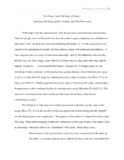| dc.description.abstract | Folk narrative and folk song are often associated with antiquarian notions of the romanticized country ‘folk’ of times long past. This makes it difficult to conceptualize the folk and their songs in more contemporary, post-industrial societies. If we are to believe Alan Dundes’ assertion that the term folk can be applied to any group of people who share at least one common factor, it would seem to follow that any such group could create folk songs. Despite this, many folklorists still rely on traditional criteria of folk songs such as anonymous authorship and oral transmission. While my intent is not to negate this, I argue that it could and should be expanded. I have used the Vietnam Anti-War movement in America to explore how the idea of ‘authentic’ folk song can be expanded to include popular music taken by a social group to give a communal voice to their movement. | en_US |

